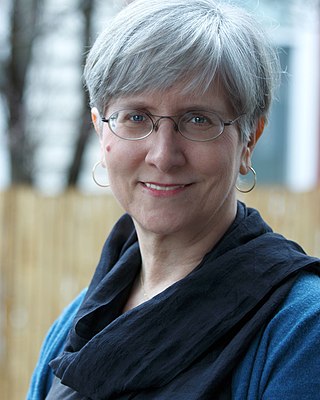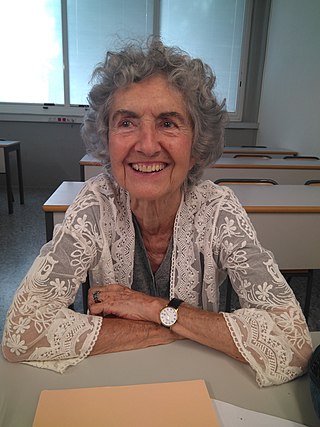Randy Pearl Albelda is an American feminist economist, activist, author, and academic who specialises in poverty and gender issues.
Marianne A. Ferber was an American feminist economist and the author of many books and articles on the subject of women's work, the family, and the construction of gender. She held a Ph.D. from the University of Chicago.

Julie A. Nelson is an emeritus professor of economics at the University of Massachusetts Boston, most known for her application of feminist theory to questions of the definition of the discipline of economics, and its models and methodology. Nelson received her Ph.D. degree in economics from the University of Wisconsin–Madison. Her work focuses on gender and economics, philosophy and methodology of economics, ecological economics, and quantitative methods. Nelson is among the founders and the most highly cited scholars in the field of feminist economics.

Feminist Economics is a peer-reviewed academic journal published by Routledge and the International Association for Feminist Economics (IAFFE) in the field of feminist economics.

Lourdes Benería is a Spanish–American economist. She was Professor Emerita at Cornell University's Department of City and Regional Planning. The author and editor of many books and articles, her work has concentrated on topics having to do with labor economics, women's work, the informal economy, Gender and development, Latin American Development and globalization. Before Cornell, she taught at Rutgers University and has given courses in other international centers. She worked at the ILO for two years and has collaborated with other UN organizations, such as UNIFEM and UNDP, and with several NGOs. She obtained her PhD at Columbia University in 1975.

Michèle Pujol, was a French feminist, economist, scholar, and human rights activist. She was an assistant professor at the University of Victoria's Department of Women's Studies and held a chair at the University of Manitoba.

Violet Eudine Barriteau,FB, GCM, is a professor of gender and public policy, as well as Principal of the University of the West Indies at Cave Hill. She was also the president of the International Association for Feminist Economics (IAFFE) from 2009 to 2010, and she is on the advisory editorial boards of Palimpsest: A Journal on Women, Gender, and the Black International, published by SUNY Press, and Signs: Journal of Women in Culture and Society, published by University of Chicago Press.

The International Association for Feminist Economics (IAFFE) is a non-profit international association dedicated to raising awareness and inquiry of feminist economics. It has some eight hundred members in over 90 countries. The association publishes a quarterly journal entitled Feminist Economics.
Edith Kuiper is the assistant professor of economics at State University of New York at New Paltz, and she was the president of the International Association for Feminist Economics (IAFFE) from 2006 to 2007.
Myra H. Strober is professor of education, emerita, for the school of education, at Stanford Graduate School of Business, Stanford, California, US. She also sits on the editorial board of Feminist Economics, and was the president of the International Association for Feminist Economics (IAFFE) from 1997 to 1999.
Jean A. Shackelford, is a professor of economics emerita in the department of economics at Bucknell University, Lewisburg, central Pennsylvania, US and, from 1993 to 1995, was the president of the International Association for Feminist Economics (IAFFE). Her book Economics: a tool for critically understanding society, co-written with Tom Riddell, Stephen C. Stamos and Geoffrey Schneider, is now in its ninth edition.
Robin L. Bartlett is a professor of economics at Denison University. She was among the founders of the International Association for Feminist Economics (IAFFE), and served as its president from 2005 to 2006.
Martha Lorraine MacDonald is the professor of economics in the department of economics, St Mary's University, Halifax, Nova Scotia, Canada, and was the president of the International Association for Feminist Economics (IAFFE) from 2007 to 2008.

Yana van der Meulen Rodgers is a professor in the Department of Labor Studies and Employment Relations in the School of Management and Labor Relations at Rutgers University,. She also works regularly as a consultant for the Asian Development Bank, the World Bank, and the United Nations. She has authored numerous journal articles in economics and has written two books. From 2018 to 2024 she served as Faculty Director of the Center for Women and Work at Rutgers, and she was the president of the International Association for Feminist Economics (IAFFE) from 2013 to 2014.
Joyce Penelope Jacobsen is a former President of Hobart and William Smith Colleges. Dr. Jacobsen was elected as the 29th President of Hobart College and the 18th President of William Smith College. Jacobsen is a scholar of economics, an award-winning teacher and an experienced administrator. She began her presidency on July 1, 2019. She is the first woman to serve as president of Hobart and William Smith Colleges.
Silvia Berger works at the Ministry of Economics and Production in Argentina, Latin American Council of Social Sciences (CLACSO), and is a post-graduate university teacher at the Latin American Social Sciences Institute. and past president of the International Association for Feminist Economics (IAFFE), her tenure was from 2017 to 2018. 7 Berger is a member of the editorial committee for the Mexican journal Ola Financiera.
Rhonda Vonshay Sharpe is an American economist who is the founder and current president of the Women's Institute for Science, Equity, and Race (WISER). She is a feminist economist who has been a faculty member at an extensive list of colleges and universities and served as president of the National Economic Association from 2017 to 2018.







